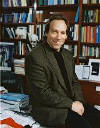|
Science and Political Ethics - When Facts Succumb to Expediency |

The
So for example the recent case of Bell Labs rogue genius in solid state electronics, Jan Hendrik Schön, is a salutary lesson that research collaborators have a responsibility for the veracity of the work being reported. But Professor Krauss goes on to make a different point, "confronting misconceptions, deliberate or not" is perhaps the most important element of progress in society. And so Krauss told his young audience, "Scientists have a special ethical responsibility at this particular time to question our government's actions. It appears that this administration is marginalizing the recommendations of major scientific organizations on the one hand, while defending artificial 'research' to support political goals, or, worse still, manufacturing it." Strong words but he is by no means the first to voice the view. University of Maryland physicist, Robert Park, author of Voodoo Science and the American Physical Society's man in Washington, has visited and revisited the arrant squandering of public resources on the International Space Station, and the Missile Defence System, the former serving no useful purpose and the latter being deployed prior to being proved capable of adequately doing what it's advertised to do. Given the maximum benefit of doubt, in its present state of development the MDS would miss the missiles its supposed to protect the citizenry against 6 times out of 10. But according to the US administration, "It's too important for it not to deploy." Australia's Coalition government also appears to have dismissed the caveat, and followed along.
Recently the US National Academy of Sciences concluded that the research program proposed by the Bush administration to analyse the effects of global warming lacked the most basic elements of a strategic research plan and slammed the absence of "a guiding vision, executable goals, clear timetables and criteria for measuring progress, an assessment of whether existing programs are capable of meeting these goals, explicit prioritization and a management plan." But then, perhaps that's the intention.
And to delve into the ludicrous, Science, Nature and Bob Park have highlighted the US Department of Energy's disregard of the National Academy of Sciences' condemnation of the use of the polygraph as a tool for ferreting out spies, security risks and malefactors in general. "The Polygraph and Lie Detection" (NAS Press, 2003), found polygraph tests to be unacceptable for DOE employee security screening because of the high rate of false positives and susceptibility to countermeasures.
Completely ignoring the NAS' admonition that the polygraph is "susceptible to countermeasures" the DOE argued that a high rate of false positives must mean the threshold for detecting lies is very low. Therefore, the test must find many true positives and consequently, "DOE does not believe that the issues that the NAS has raised about the polygraph's accuracy are sufficient to warrant a decision by DOE to abandon it as a screening tool." Bob Park, however, points out, "anyone can be trained to fool the polygraph in just five minutes," and goes on to recommend "replacing the polygraph with a coin toss. If a little collateral damage is not a problem, coins will catch fully half of all spies, a vast improvement over the polygraph, which has never caught even one. Moreover, coins are notoriously difficult to train, making them impervious to countermeasures."
All of this would be meat for a
B-grade farce were it not for the serious lack of responsibility
demonstrated by a nation's leaders and their deputies and the squandering of
public funds. The Australian Government doesn't appear to be immune to the
disease. So for example, while the Australian Research Council is the only body
funding basic research outside the medical sciences, a significant, but
unaccounted for, proportion of its hardly overgenerous funding goes to strategic
and applied research. And the only avenue for basic research, the universities, remain the focus of
governmental
In the meantime, CSIRO's Chief Executive, Geoffrey Garrett continues hand waving about his "Flagship Programs" while we and apparently the CSIRO Board remain ignorant of the chapter and verse of just what will constitute their implementation and how it is to be performed. Undeterred, the Minister for Science, Peter McGauran, says in a media release, "The initiative will deliver scientific solutions to some of the most pressing issues facing Australia today," while the Prime Minister, John Howard, couching his praise with apparent care told a Melbourne audience:
… CSIRO is one of those great Australian icons and deservedly so because it's demonstrated, as its current chairman just indicated, that extraordinary Australian capacity for adaptability and innovation.
…what is tremendously important is that once again CSIRO has responded, it's identified some Flagships and I congratulate it for that. I wish these initiatives well, I thank the science community, I thank CSIRO for the contribution it's making to the national well-being, and long may it continue to do so and I have great pleasure in joining you in launching this and continuing the nautical analogy.
Currently there is no indication that either the Prime Minister or the Minister for Science is much better informed than the general public as to specifically just what is to be accomplished by Dr. Garrett's "Big Hairy Audacious" Flagship Programs and how.
It's a curious phenomenon but with every public poll that is announced, we are told the electorate considers education one of the most important matters when determining voting preferences. But both major parties know that's just not so. When it comes to those factors which really determine which way we swing our vote, a party's stand on support for education, and particularly higher education let alone research, isn't of deciding consequence.
Returning to Professor Krauss' advice
to his young audience, "
I